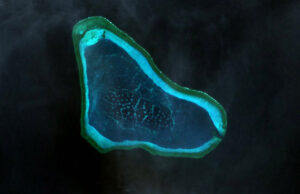By Adrian H. Halili and John Victor D. Ordoñez, Reporters
THE US on Wednesday condemned the “dangerous” maneuvers of a Chinese Navy helicopter that endangered the safety of a Philippine government aircraft patrolling a disputed shoal in the South China Sea.
In a post on X, US Ambassador to the Philippines Mary Kay L. Carlson also urged China to “refrain from coercive actions and settle its disputes peacefully in accordance with international law.”
The Philippines on Tuesday said it was “deeply disturbed” by the Chinese navy’s “unprofessional and reckless” flight actions and that it would file a diplomatic protest.
Manila’s coast guard said the Chinese navy helicopter performed dangerous flight maneuvers when it flew close to a government aircraft conducting surveillance over Scarborough Shoal, endangering the lives of its pilots and passengers.
The People’s Liberation Army Navy helicopter flew as close as three meters to the aircraft, which the Philippine Coast Guard said was a “clear violation and blatant disregard” of aviation regulations.
China disputed the Philippines’ account, saying on Tuesday its aircraft “illegally intruded” into China’s airspace and accused its Southeast Asian neighbor of “spreading false narratives.”
Named after a British ship that was grounded on the atoll nearly three centuries ago, Scarborough Shoal is one of the most contested maritime feature in the South China Sea, where Beijing and Manila have clashed repeatedly.
“The Philippines has undeniable sovereignty and jurisdiction over Bajo de Masinloc,” its National Maritime Council said in a statement, using Manila’s name for the shoal.
“China’s illegal, coercive, and aggressive behavior will not deter the Philippines from continuing the conduct of its routine maritime operations in accordance with its sovereignty over the shoal,” it added.
Senator Ana Theresia N. Hontiveros-Baraquel said China has been stirring trouble by routinely disrespecting international laws.
“(China) is a signatory to the United Nations Convention on the Law of the Sea and a contracting member of the International Civil Aviation Organization, and yet it shamelessly ignores these international norms,” she said in a statement.
China claims over 80% of the waterway in the South China Sea, but the Permanent Court of Arbitration voided its claim in 2016. China rejects this claim.
China claims sovereignty over almost the entire South China Sea, a vital waterway for more than $3 trillion of annual ship-borne commerce, putting it at odds with Brunei, Indonesia, Malaysia, the Philippines and Vietnam.
A United Nations-backed tribunal based in the Hague in 2016 voided China’s claim for being illegal, but Beijing does not recognize the ruling.
Meanwhile, President Ferdinand R. Marcos, Jr. has signed into law a bill that will fix the term of the Philippine Coast Guard (PCG) commandant to three years, which is expected to keep the agency’s leadership structure stable amid tensions with China.
Republic Act No. 12122, which the President signed into law on Feb. 18, gives the PCG chief a three-year term unless relieved from their post.
Senate President Francis G. Escudero earlier said the measure would help the agency secure Manila’s territorial waters and shores.
In October, Mr. Marcos vowed to upgrade the assets and increase the PCG’s fleet to boost maritime domain awareness.
The PCG was under the Department of National Defense before it was transferred to the Office of the President on March 30, 1998 through an order issued by the late President Fidel V. Ramos.
Less than a month later, Mr. Ramos transferred the PCG to the Department of Transportation and Communications, which was split into two separate agencies in 2016 through a law signed by the late President Benigno S.C. Aquino III.
The coast guard launched a transparency campaign in 2023 to expose China’s attacks on its assets, a strategy that has helped Manila gain more support from the international community. — with Reuters
